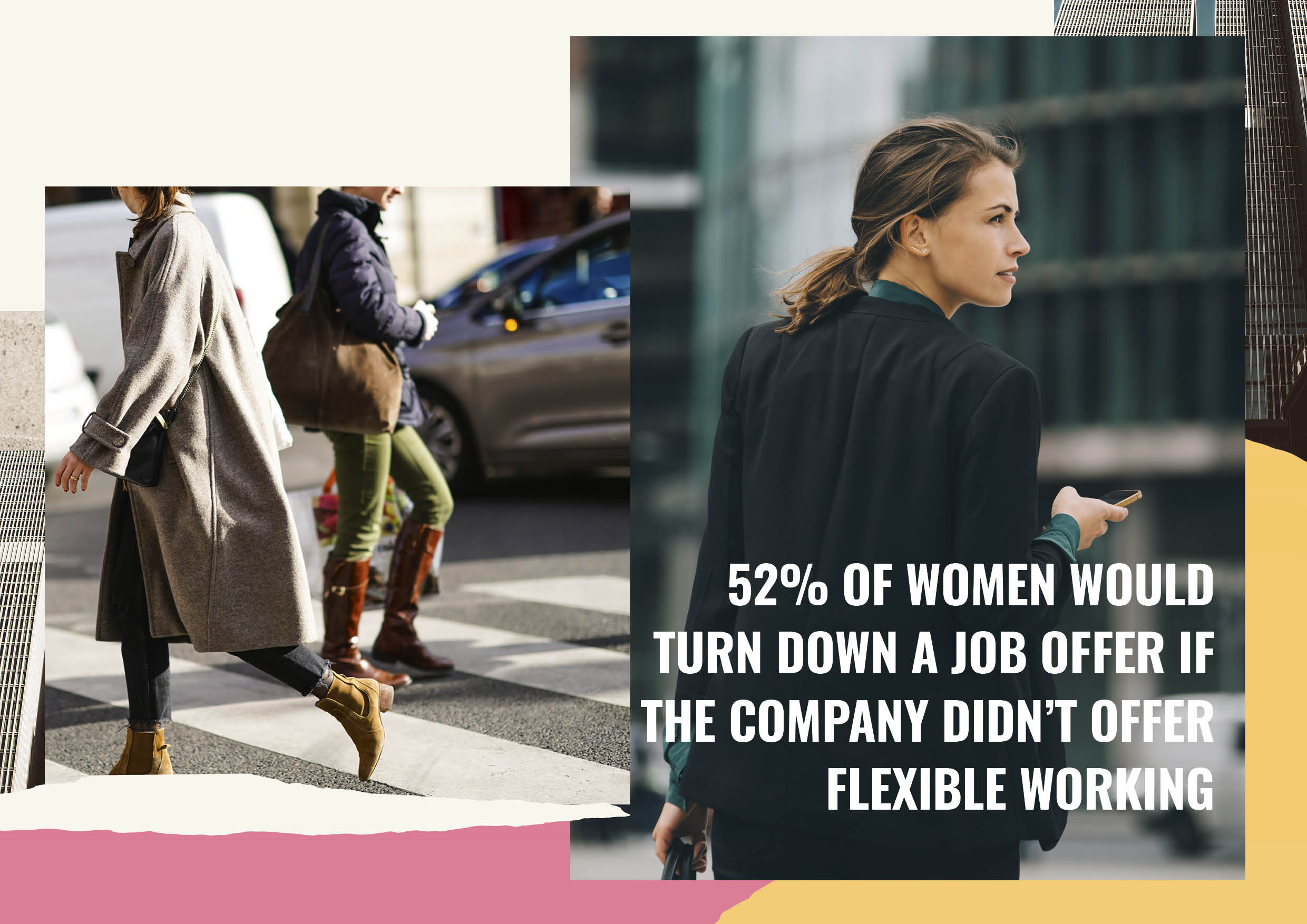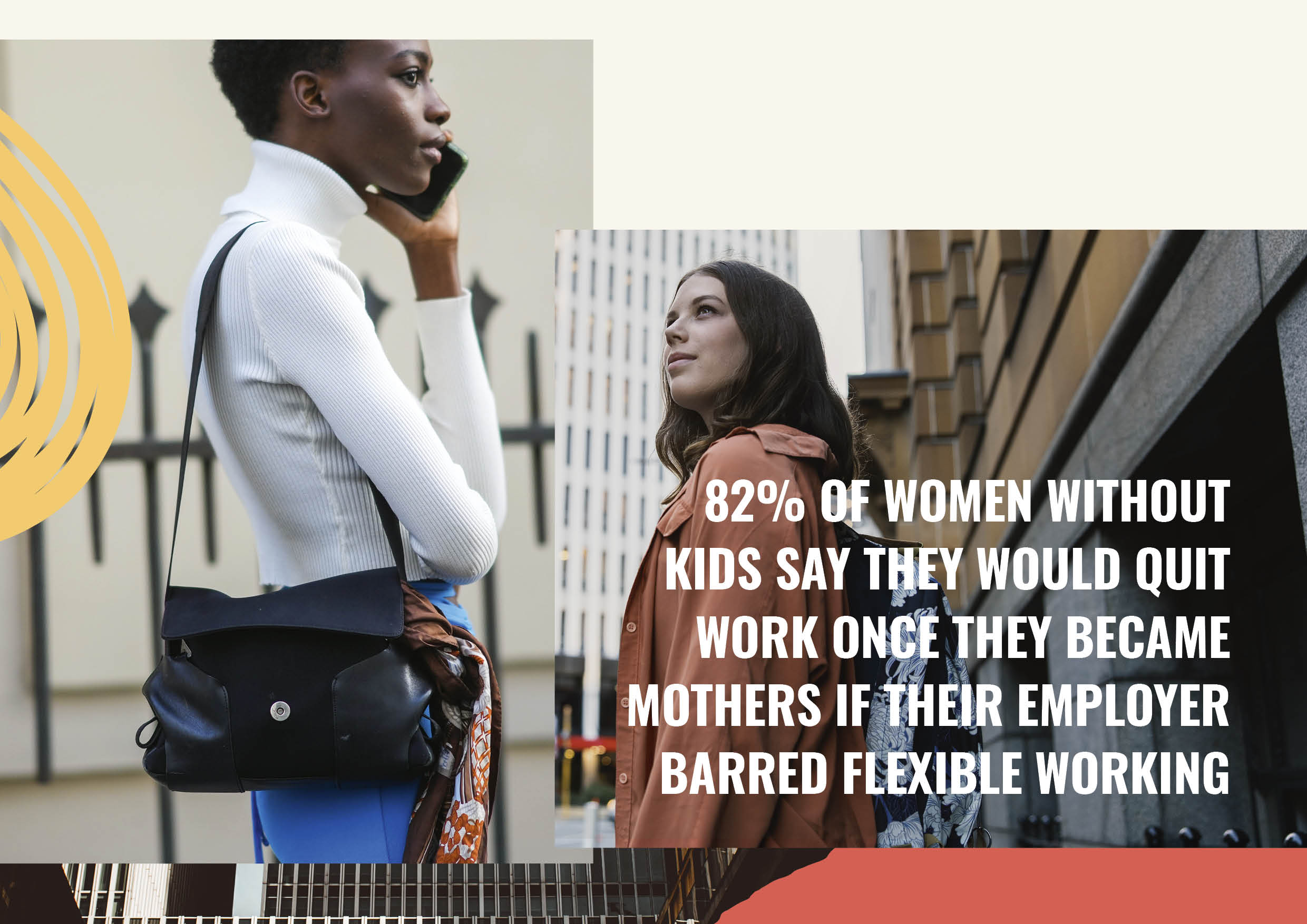Over half of the female workforce would abandon a job that didn't offer flexible working
One year on from Marie Claire's first Future of Work collaboration with LinkedIn, we revisit the topic everybody's talking about: flexible working


One year on from Marie Claire's first Future of Work collaboration with LinkedIn, we revisit the topic everybody's talking about: flexible working
The last eighteen months flipped everything we knew and understood about office life on its head. As the coronavirus pandemic forced us to swap desk banks for dining tables, it quickly became clear that 'bums on seats' didn't necessarily equal productivity. Many industries could work just as effectively from a remote location, it seemed.
... and then began the debates. What would the new future of work look like? Would working from home become a permanent fixture in our lives, and would it be full-time or a hybrid approach? Or, do we put a new generation of professionals at a major disadvantage by largely abandoning the 9-5 office life?
This ongoing buzz of conversation is exactly why Marie Claire partnered with LinkedIn last year; to explore how the British population felt about the prospect of returning to the old routine.
A year has passed since then, we've endured what has felt like an eternity lockdowns, and we're now teetering on the edge of a mass return to the office. So, we felt it only right to investigate how working women really feel about the future of work – and the results are very telling...
A future of work without flexibility could be a future of work without women
There was a resoundingly clear message from the data we gathered from thousands of working women of childbearing age: employers need to prioritise flexible working going forward.
"A year on from our first Future of Work survey, what's clear is that employers must acknowledge that flexibility is vital if they want to retain female talent and achieve genuine gender equality at work," says Andrea Thompson, Editor-in-Chief of Marie Claire. "The alternative is women dropping out of the workforce at critical points in their career journeys."
Marie Claire Newsletter
Celebrity news, beauty, fashion advice, and fascinating features, delivered straight to your inbox!

Over half of women (52%) surveyed by Marie Claire and LinkedIn said they would turn down a job offer if the company didn’t offer the flexible working they required to maintain a work/life balance. Which is a pretty big deal.
What's more, almost as many (50%) said they would quit a job they already had if it didn’t offer them what they needed flexibility-wise. It's time for women to put themselves first, and we are all for it.
While, says Thompson, "our study focussed specifically on women's opinions", she caveats, "equality in the workplace can only happen when flexibility is perceived as something for all – women, men, parents and non-parents. Why should caring responsibilities be a concern solely for women?"
It seems clear that a major priority for women both with and without children is the flexibility to pursue careers while also having a sense of work life balance.
“We know that the pandemic has had a disproportionate impact on women and their careers – we can see it clearly in this research with Marie Claire and on our platform where women have come together over the last eighteen months to share their experiences, advice and support," says Janine Chamberlin, UK Country Manager at LinkedIn.
"Encouraging staff to work flexibly if it suits them should be a top priority for employers. In this new world of work, for employers to remain attractive it’s going to be important for them to evolve their workplace policies to offer greater flexibility which people now expect, remove masculine-coded language from job descriptions which we know can put off female candidates from applying, and consider their benefits to allow for a better work-life balance."
Flexibility is a fundamental
Melissa Jamieson, CEO of flexible working consultancy Timewise, agrees. "For many people, flexible working is the key to making life work. It's a fundamental," she says. "Consider that 5.7m of the UK’s 7.8m part-time workers are female – and you begin to understand just how important flexibility is to women, on time alone."
But, says Jamieson, compare these figures to the fact that 78% of UK job ads make no reference to flexible working of any sort, and "thousands of women get stuck in jobs that are beneath their level of skill and ability, because these are the only kinds of roles they can find with the flex they need."
This isn't just a phase
That considered, when you look at some of the other things we learned from this year's Marie Claire/LinkedIn survey, it's clear to see why women are so adamant that flexible working must not just be a phase.
For women with children, 70% said that flexible working reduces their need for childcare. And let's not forget, childcare is expensive. In fact, almost half of the women surveyed (49%) spend anywhere between 25% - 40% of their salary on childcare. A further 14% of working mothers, meanwhile, spend a huge 41% to 50% of their salary on childcare. When you consider just how much money that is every month, it's easy to understand why so many women decide to give up working while their children are young.
“When I got married I was scared about what would happen to my career but I knew it was the right time for me to start a family, as I always knew I’d like to have children," says Luana, a graphic designer who took part in the survey.
"When I was on maternity leave I asked my employer about flexible working, and received no response for over a month. Eventually my employers’ lack of interest in offering any flexibility forced me to quit," the now-freelancer says.

The time is now
"Now is the time for us to change the working world as we know it, and for employers to be more human," says Anna Whitehouse, the broadcaster, journalist and flexible working campaigner better known as Mother Pukka.
"The way people are managed plays a huge role in mental wellbeing. If employers gave their staff, who they have recruited and believe to be trustworthy and decent, the choice to work from home as many days a week as they choose, we will only see positive outcomes."
Not only, then, is flexible working a non-negotiable for working parents, it's a no-brainer for their employers as well.
"The conversation needed isn’t ‘should’ we implement the belief that flexible working is the future – of course we should – but ‘how’ can we implement it. For the majority of white-collar workers, taking their laptop to the kitchen table is enough," says Whitehouse.
While it's not quite so straightforward for, say, NHS staff, Whitehouse admits, the industries traditionally excluded from home working "can still work flexibly by choosing the shifts that suit their lives, rather than being told when they will be working and for how long".
However, this was far from the case for Alice Thompson, a former estate agent who this week won a case against her employer after they refused to let her leave work early to collect her daughter from nursery. After putting in a request to move down to four days a week, and to leave work at 5pm, rather than the standard 6pm, Thompson was refused a more flexible working arrangement and forced to resign.
But she's far from an isolated case: 82% of the women we surveyed said they would give up work while raising their children if their employer did not support them with flexibility. Add to this the fact that women only hold around a third of roles in the boardrooms of Britain’s top 350 companies as is, and that number could risk decreasing if more are forced to abandon their careers because the work/family juggle is too much of a strain.
Out of shape
"The UK’s recruitment market is shaped for one kind of worker and a model that doesn’t reflect how we really work right now," says Jamieson, whose consultancy is helping employers "make more good jobs flexible, and more flexible jobs 'good'".
"If we don’t," she warns, "we face sliding back on years of progress made in terms of gender equality.”
Flexible working doesn't just benefit women who already have children, however. 83% of all the women we surveyed said that working from home more would benefit their mental health. And for some, having the opportunity to work remotely or to work non-9-5-hours would even change their family plans; almost a third of women (29%) say they would have children sooner if they knew they could work flexibly.
"One upside of the prolonged period of working from home is how it has encouraged employers to take action on flexible working, offering women a working pattern more conducive to family life," says Chamberlin. "We are finally starting to break down the barriers defined by a traditional presenteeism culture in a way that is supportive of women.”
What's clear is that flexible working is a Big. Deal. It doesn't mean we want to abandon offices forever - it just means we need employers to trust that bestowing this freedom upon their workers will end up yielding far better results than having a fully-occupied bank of desks Monday to Friday.
Let's just hope that when it comes to making these long-term decisions, they remember that.
Cat is a Senior Editor at Marie Claire, covering news and features across the brand's key purpose pillars, including women's issues, politics, career, mental health, female empowerment and equality, as well as books.
-
 Kendall Jenner, Em Rata and Simone Ashley love this affordable Aussie fashion brand—and it's finally available in the UK
Kendall Jenner, Em Rata and Simone Ashley love this affordable Aussie fashion brand—and it's finally available in the UKChic styles from down under
By Jazzria Harris
-
 I’m a size 18 Fashion Editor—these are the most flattering plus-size jeans I’ve tried
I’m a size 18 Fashion Editor—these are the most flattering plus-size jeans I’ve triedCurve denim that's worth every penny
By Stephanie Yeboah
-
 Modern Pilates is one of the most fun yet effective ways to strengthen and lengthen your body - 6 exercises to try
Modern Pilates is one of the most fun yet effective ways to strengthen and lengthen your body - 6 exercises to tryKeen to strengthen your entire body? This one's for you.
By Anna Bartter